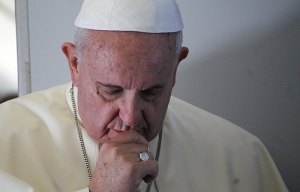The guidelines of the Roman Catholic Church concerning investing and economic issues are based in Mosaic Law, and are found in Book of Exodus and Deuteronomy. The Seventh Commandment “Thou Shalt Not Steal”, is our main inspiration, and instructions to the faithful fall would under the Catholic Church’s Doctrine on Social Justice.
The Catechism of the Catholic Church (CCC) always provides balance regarding complex economic issues since economic activity always involves a meeting or exchange between two or more persons.
The CCC states in #2413
“Games of chance (card games, etc.) or wagers are not in themselves contrary to justice. They become morally unacceptable when they deprive someone of what is necessary to provide for his needs and those of others. The passion for gambling risks becoming enslavement. Unfair wagers and cheating at games constitute grave matter, unless the damage inflicted is so slight that the one who suffers it cannot reasonably consider it significant”.
High Frequency Trading (HFT), isn’t gambling or wagering. Its main economic function is “market-making” or providing liquidity. Since there is risk involved in buying and selling even on a microsecond basis, it’s a legitimate form of trading activity. The popularity of electronic trading, high speed internet connections, narrow bid / ask spreads all benefit the retail investor and make for a more efficient exchange of goods (stocks) and transfer of risk.
Does it cause damage? Even if investors and pensions have to “pay- up” the extra 1/10th of a penny in share price, the loss in my opinion is so slight, that it cannot reasonably be considered significant.
CCC # 2424
“Any system in which social relationships are determined entirely by economic factors is contrary to the nature of the human person and his acts”.
As a former Chicago Board Options Exchange pit trader, my relationship with other traders and brokers may have been determined by economic factors, but my primarily role was “market-maker” with obligations to brokers and the Exchange, as well as breadwinner for my family. The danger for many traders was not recognizing that there was a person on the other side of the “market” order.
“Human work proceeds directly from persons created in the image of God and called to prolong the work of creation by subduing the earth, both with and for one another. Hence work is a duty…[w]ork honors the Creator’s gifts and the talents received from him. It can also be redemptive”.
CCC #2428
“In work, the person exercises and fulfills in part the potential inscribed in his nature. The primordial value of labor stems from man himself, its author and its beneficiary. Work is for man, not man for work. Everyone should be able to draw from work the means of providing for his life and that of his family, and of serving the human community”.
CCC #2429
“Everyone has the right of economic initiative; everyone should make legitimate use of his talents to contribute to the abundance that will benefit all and to harvest the just fruits of his labor. He should seek to observe regulations issued by legitimate authority for the sake of the common good”.
Conclusion
The trading firm I worked for was late to the ECN game and didn’t start using the trading platform REDI until the late 1990’s (1). REDI was launched in 1992 by Spear, Leeds & Kellogg, and subsequently acquired by Goldman Sachs in 2000.
High Frequency Trading was pioneered by GETCO in 1999. According to Wikipedia, GETCO was founded by former Chicago floor traders Stephen Schuler and Daniel Tierney. (2)
From my perspective, Stephen and Daniel were making legitimate use of their talents to contribute to the abundance that will benefit all. We also have to remember the developers, IT personnel, network engineers, compliance directors, and computer engineers behind the development and expansion of High Frequency Trading. Any programmer can tell you that getting some algorithms to function properly and without error is every bit as frustrating as a carpenter framing an inside wall.
The issue I have not been able to reconcile is the common practice of Exchanges in offering economic incentives to “make” or “take” liquidity. This practice attenuates the economic risks normally involved in algo trading as traders seek to buy and sell shares all day long for the exact same price; since the strategy is to acquire a profit from the Exchange “payment for order flow” practices, and not from “buying wholesale and selling retail” as in a traditional bid-ask spread.
Then again, Exchanges are now organized as publicly traded profit centers, and need to attract customers to their trading centers. Each Exchange is in competition with the other which is usually a good thing.
In my opinion, if Pope Francis understood HFT, I don’t think he would have a problem with it.
(1) http://www.redi.com/index-2.html#section_our_story
(2) https://en.wikipedia.org/wiki/Global_Electronic_Trading_Company

